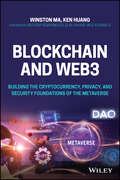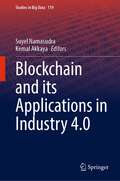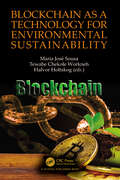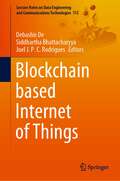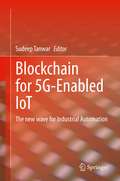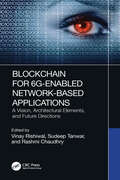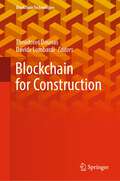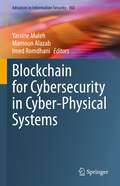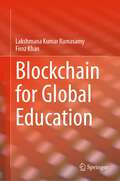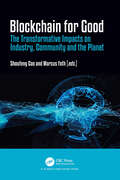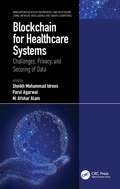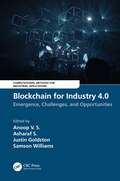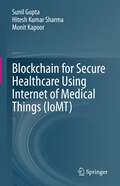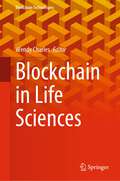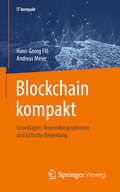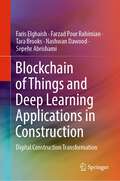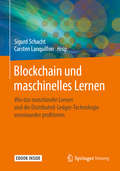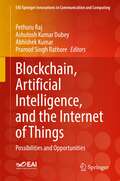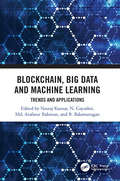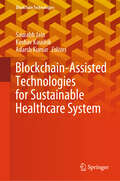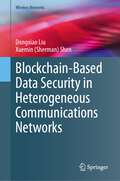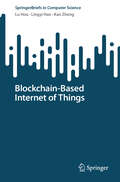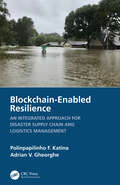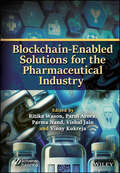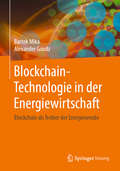- Table View
- List View
Blockchain and Web3: Building the Cryptocurrency, Privacy, and Security Foundations of the Metaverse
by Winston Ma Ken HuangAn in-depth and authoritative treatment of one of the most pressing topics of our time In Blockchain and Web3: Building the Cryptocurrency, Privacy, and Security Foundations of the Metaverse, two tech and finance experts deliver a comprehensive and accessible guide to the present and future of blockchain technology and how it will form the foundation of a new, better internet. To support a concept as bold as the Metaverse, we need several orders of magnitude more powerful computing capability, accessible at much lower latencies, across a multitude of devices and screens. You&’ll discover how blockchain can accelerate data flow, exchange, and transactions to create and transfer value around the world and, at the same time, how it can be used to protect user data privacy and security with decentralized web infrastructures. The book also includes: Discussions of how sovereign governments are entering the blockchain fray and how their entry, especially with CBDC digital currency, shapes the conversations around Web3 Explorations of whether we will ever realize the holy grail of blockchain tech: interoperability to compete with Big Tech platformsDiscussion of new security and privacy issues rising from the intersection of Blockchain, Web3 and Metaverse.A fascinating and eye-opening treatment of the past, present, and future of blockchain and the role it will play on the internet and metaverse, Blockchain and Web3 is a truly original and engaging discussion of a timely and critical topic.
Blockchain and its Applications in Industry 4.0 (Studies in Big Data #119)
by Suyel Namasudra Kemal AkkayaThis book discusses fundamentals of Blockchain technology and Industry 4.0. It discusses many applications of Blockchain technology in Industry 4.0, including integration of AI, IoT, and big data with Blockchain for Industry 4.0. It provides cutting-edge research content from researchers, academicians, and other professionals from different background areas to show their state-of-the-art knowledge to use Blockchain in Industry 4.0. The book discusses advantages of Industry 4.0, such as improved productivity, improved efficiency, flexibility, agility, better user experience, and many more, and also entails some challenges too, such as trust, traceability, security, reliability, transparency, etc., for creating an application of Industry 4.0. The book helps graduate, postgraduate, doctoral students, and industrial professionals to implement Blockchain in Industry 4.0.
Blockchain as a Technology for Environmental Sustainability
by Halvor Holtskog Maria José Tewabe Chekole WorknehAt a time of growing environmental concerns and an urgent need for sustainable solutions, the intersection of blockchain technology and environmental sustainability is emerging as a powerful force for positive change. The environmental challenges of our time, including climate change, resource scarcity and the destruction of ecosystems, require innovative solutions that transcend geographical and political boundaries. Blockchain technology, with its decentralized and transparent nature, can not only track and verify environmental efforts, but also incentivize them.
Blockchain based Internet of Things (Lecture Notes on Data Engineering and Communications Technologies #112)
by Debashis De Siddhartha Bhattacharyya Joel J. P. C. RodriguesThe book is aimed to foster knowledge based on Blockchain technology highlighting on the framework basics, operating principles and different incarnations. The fundamental problems encountered in existing blockchain architectures and means for removing those would be covered. It would also touch upon blockchain based IoT systems and applications. The book covers applications and use cases of blockchain technology for industrial IoT systems. In addition, methods for inducing computational intelligence into existing blockchain frameworks thereby thwarting most of the limitations are also discussed. The readers would benefit from the rich technical content in this rapidly emerging field thereby enabling a skilled workforce for the future.
Blockchain for 5G-Enabled IoT: The new wave for Industrial Automation
by Sudeep TanwarThis book addresses one of the most overlooked practical, methodological, and moral questions in the journey to secure and handle the massive amount of data being generated from smart devices interactions: the integration of Blockchain with 5G-enabled IoT. After an overview, this book discusses open issues and challenges, which may hinder the growth of Blockchain technology. Then, this book presents a variety of perspectives on the most pressing questions in the field, such as: how IoT can connect billions of objects together; how the access control mechanisms in 5G-enabled industrial environment works; how to address the real-time and quality-of-service requirements for industrial applications; and how to ensure scalability and computing efficiency. Also, it includes a detailed discussions on the complexity of adoption of Blockchain for 5G-Enabled IoT and presents comparative case studies with respect to various performance evaluation metrics such as scalability, data management, standardization, interoperability and regulations, accessibility, human-factors engineering and interfaces, reliability, heterogeneity, and QoS requirements. This book acts as a professional guide for the practitioners in information security and related topics.
Blockchain for 6G-Enabled Network-Based Applications: A Vision, Architectural Elements, and Future Directions
by Sudeep Tanwar Vinay Rishiwal Rashmi ChaudhryThis book provides a comprehensive overview of blockchain for 6G-enabled network-based applications. Following the key services of blockchain technology, this book will be instrumental to ideate and understand the necessities, challenges, and various case studies of different 6G-based applications. The emphasis is on understanding the contributions of blockchain technology in 6G-enabled applications, and its aim is to give insights into evolution, research directions, challenges, and the ways to empower 6G applications through blockchain. The book consistently emphasizes the missing connection between blockchain and 6G-enabled network applications. The entire ecosystem between these two futuristic technologies is explained in a comprehensive manner. The book constitutes a one-stop guide to students, researchers, and industry professionals. The book progresses from a general introduction toward more technical aspects while remaining easy to understand throughout. Comprehensive elaboration of material is supplemented with examples and diagrams, followed by easily understandable approaches with regard to technical information given thereon. Blockchain and its applications in 6G-enabled applications can drive many powerful solutions to real-world technical, scientific, and social problems. This book presents the most recent and exciting advances in blockchain for 6G-enabled network applications. Overall, this book is a complete outlet and is designed exclusively for professionals, scientists, technologists, developers, designers, and researchers in network technologies around blockchain integration with IoT, blockchain technology, information technology, and 6G-enabled industrial applications. Secondary readers include professionals involved in policy making and administration, security of public data and law, network policy developers, blockchain technology experts, regulators, and decision makers in government administrations.
Blockchain for Construction (Blockchain Technologies)
by Theodoros Dounas Davide LombardiThis book highlights the design, use and structure of blockchain systems and decentralized ledger technologies (B/DLT) for use in the construction industry. Construction remains a fragmented change-resistant industry with chronic problems of underproductivity and a very low digitization factor compared to other fields. In parallel, the convergence, embedding and coordination of digital technologies in the physical world provides a unique opportunity for the construction industry to leap ahead and adopt fourth industrial revolution technologies. Within this context, B/DLT are an excellent fit for the digitization of the construction industry. B/DLT are effective in this as they organize and align digital and physical supply chains, produce stigmergic coordination out of decentralization, enable the governance of complex projects for multiple stakeholders, while enabling the creation of a new class of business models and legal instruments for construction.
Blockchain for Cybersecurity in Cyber-Physical Systems (Advances in Information Security #102)
by Imed Romdhani Yassine Maleh Mamoun AlazabThis book offers the latest research results on blockchain technology and its application for cybersecurity in cyber-physical systems (CPS). It presents crucial issues in this field and provides a sample of recent advances and insights into the research progress. Practical use of blockchain technology is addressed as well as cybersecurity and cyber threat challenges and issues. This book also offers readers an excellent foundation on the fundamental concepts and principles of blockchain based cybersecurity for cyber-physical systems. It guides the reader through the core ideas with expert ease.Blockchain technology has infiltrated all areas of our lives, from manufacturing to healthcare and beyond. Cybersecurity is an industry that has been significantly affected by this technology, and maybe more so in the future. This book covers various case studies and applications of blockchain in various cyber-physical fields, such as smart cities, IoT, healthcare, manufacturing, online fraud, etc.This book is one of the first reference books covering the application of blockchain technology for cybersecurity in cyber-physical systems (CPS). Researchers working in the cybersecurity field and advanced-level students studying this field will find this book useful as a reference. Decision-makers, managers and professionals also working in this field will want to purchase this book.
Blockchain for Global Education
by Firoz Khan Lakshmana Kumar RamasamyThis book presents Blockchain technology and its various applications in educational environments. The authors show how Blockchain has the potential to revolutionize the field of education by creating decentralized and secure platforms for connecting students and educators across borders. The book also discusses the challenges and limitations of implementing Blockchain in education, such as technical complexity, lack of standardization, and regulatory issues. The authors provide several examples and case studies that demonstrate how Blockchain technology can be used to improve various aspects of education. The authors also recognize that Blockchain technology evolves rapidly and address the potential impact of the technology on the field of education in the future. In addition to general educational applications, the authors also provide a global perspective, addressing the potential impact of technology on education in various countries and regions.
Blockchain for Good: The Transformative Impacts on Industry, Community and the Planet
by Marcus Foth Shoufeng CaoBlockchain, a technology originally developed for cryptocurrency, has evolved into a versatile tool capable of driving significant change across industries and communities. Its decentralised, secure, and transparent nature has proven valuable in applications that transcend finance, impacting supply chains, digital governance, and sustainability practices. By enabling greater trust and accountability, blockchain technology can foster ethical solutions to global challenges, promoting transparency, inclusivity, and efficiency within sectors like agriculture, healthcare, and environmental management. This book explores blockchain’s role as a catalyst for meaningful change and its potential to contribute positively to our digital future.Structured into three parts—Industry, Community, and Planet—this book examines blockchain’s role in advancing (i) sustainable business practices, (ii) supporting fairer social systems, and (iii) addressing environmental goals. Each section presents diverse case studies and theoretical insights, showing how blockchain can be applied responsibly and ethically. From enhancing transparency in fashion supply chains to supporting smallholder farmers, and from reshaping public governance to promoting the circular economy, the book offers a thorough understanding of blockchain’s transformative capabilities. It highlights interdisciplinary research and applied projects across the globe that exemplify blockchain’s capacity to serve societal and environmental purposes.Ideal for researchers, policymakers, and industry professionals, this book provides practical insights into blockchain’s potential beyond the hype. Whether you are in technology, social sciences, or environmental studies, Blockchain for Good serves as an essential resource for anyone interested in exploring how blockchain can contribute to a more equitable and sustainable world.
Blockchain for Healthcare Systems: Challenges, Privacy, and Securing of Data (Innovations in Health Informatics and Healthcare)
by M. Afshar Alam Sheikh Mohammad Idrees Parul AgarwalBlockchain for Healthcare Systems: Challenges, Privacy, and Securing of Data provides a detailed insight on how to reap the benefits of blockchain technology in healthcare, as the healthcare sector faces several challenges associated with privacy and security issues. It also provides in-depth knowledge regarding blockchain in healthcare and the underlying components.This book explores securing healthcare data using blockchain technology. It discusses challenges and solutions for blockchain technology in the healthcare sector and presents the digital transformation of the healthcare sector using different technologies. It covers the handling of healthcare data/medical records and managing the medical supply chain all using blockchain technology.The contents of this book are highly beneficial to educators, researchers, and others working in a similar domain.
Blockchain for Industry 4.0: Blockchain for Industry 4.0: Emergence, Challenges, and Opportunities (Computational Methods for Industrial Applications)
by Anoop V. S.This reference text provides the theoretical foundations, the emergence, and the application areas of Blockchain in an easy-to-understand manner that would be highly helpful for the researchers, academicians, and industry professionals to understand the disruptive potentials of Blockchain. It explains Blockchain concepts related to Industry 4.0, Smart Healthcare, and the Internet of Things (IoT) and explores Smart Contracts and Consensus algorithms. This book will serve as an ideal reference text for graduate students and academic researchers in electrical engineering, electronics and communication engineering, computer engineering, and information technology. This book • Discusses applications of blockchain technology in diverse sectors such as industry 4.0, education, finance, and supply chain. • Provides theoretical concepts, applications, and research advancements in the field of blockchain. • Covers industry 4.0 digitization platform and blockchain for data management in industry 4.0 in a comprehensive manner. • Emphasizes analysis and design of consensus algorithms, fault tolerance, and strategy to choose the correct consensus algorithm.• Introduces security issues in the industrial internet of things, internet of things, blockchain integration, and blockchain-based applications. The text presents in-depth coverage of theoretical concepts, applications and advances in the field of blockchain technology. This book will be an ideal reference for graduate students and academic researchers in diverse engineering fields such as electrical, electronics and communication, computer, and information technology.
Blockchain for Secure Healthcare Using Internet of Medical Things (IoMT)
by Sunil Gupta Hitesh Kumar Sharma Monit KapoorHealthcare has become an extremely important and relevant topic in day to day discussions ever since the COVID-19 pandemic has been encountered by the global population. This has led to a renewed focus and attention that researchers from every discipline have put in to realize better strategies for healthcare management in general. This book is an attempt to put to use recent advancements in the field of the Internet of Medical Things often called IoMT, which is an extension of IoT for real-time, data analytics-driven prompt and quality healthcare to global citizens. Security has been always a challenge with pervasive technologies like IoMT and IoT, and thus usage of disruptive technology like blockchain to offset the security concerns that surround the data and network management. Therefore, this book is an honest attempt to provide directions to applied areas of research in IoMT for healthcare with the aid and help of Blockchain Technologies.
Blockchain in Life Sciences (Blockchain Technologies)
by Wendy CharlesThis book highlights the latest advances on the implementation and adaptation of blockchain technologies in real-world scientific, biomedical, and data applications. It presents rapid advancements in life sciences research and development by applying the unique capabilities inherent in distributed ledger technologies. The book unveils the current uses of blockchain in drug discovery, drug and device tracking, real-world data collection, and increased patient engagement used to unlock opportunities to advance life sciences research. This paradigm shift is explored from the perspectives of pharmaceutical professionals, biotechnology start-ups, regulatory agencies, ethical review boards, and blockchain developers. This book enlightens readers about the opportunities to empower and enable data in life sciences.
Blockchain kompakt: Grundlagen, Anwendungsoptionen und kritische Bewertung (IT kompakt)
by Andreas Meier Hans-Georg FillLernen Sie in diesem Fachbuch mehr über die Grundlagen von BlockchainSie interessieren sich für Kryptowährungen durch Blockchain-Technologie? Aber irgendwie erscheint Ihnen die Thematik wie ein Buch mit sieben Siegeln? Dieses Fachbuch von Hans-Georg Fill und Andreas Meier liefert Ihnen einen Überblick rund um Blockchain. Es erläutert detailliert und übersichtlich die Grundlagen zu folgenden Themenfeldern:Datenstrukturen wie Hash-Funktionen und -BäumeDigitale SignaturFunktionenKonsensalgorithmenetc.Blockchains sind jedoch nicht nur ein Teil von Kryptowährungen. Es handelt sich um ein digitales Buchungssystem. Die Technologie von Ethereum ist daher für viele Unternehmen äußerst interessant (Stichwort Smart Contracts, Smart Grid, Smart Cities). Das Fachbuch über Blockchain ist somit genau das Richtige für Sie, wenn Sie Verbesserungen im eigenen Unternehmen, der Verwaltung oder im öffentlichen Leben vornehmen oder alternative Lösungen angehen wollen.Konzepte und Anwendungen der KryptographieIn den sechs Kapiteln des Fachbuches über Blockchain liefern Ihnen die Autoren Antworten auf verschiedene rechtliche Fragen. Sie befassen sich im Rahmen ihrer Ausführungen kritisch mit der Blockchain-Technologie und zeigen Ihnen wichtige Anwendungsoptionen. Sie erhalten einen fundierten Überblick über folgende Themenfelder:Motivation Betrugsprävention Grundlagen zur Blockchain-Technologie Aufbau und Funktion der BlockchainAnwendungsoptionen Rechtliche FragenKritische EinschätzungDieses Fachbuch über Blockchain richtet sich an Führungsverantwortliche, Projektleiter und Interessierte, die sich einen Überblick über das Potenzial der Blockchain-Technologie verschaffen möchten.
Blockchain of Things and Deep Learning Applications in Construction: Digital Construction Transformation
by Farzad Pour Rahimian Sepehr Abrishami Faris Elghaish Tara Brooks Nashwan DawoodThis book significantly contributes the digital transformation of construction. The book explores the capabilities of deep learning to provide smart solutions for the construction industry, particularly in areas of managing equipment, design optimization, energy optimization and detect cracks for buildings and highways. It provides conceptual solutions but also practical techniques. A new deep learning CNN-based highway cracks detection is demonstrated, and its usefulness is tested. The resulting deep learning CNN model will enable users to scan long distance of highway and detect types of cracks accurately in a very short time compared to traditional approaches.The book explores the integration of IoT and blockchain to provide practical solutions to tackle existing challenges like the endemic fragmentation in supply chain, the need for monitoring construction projects remotely and tracking equipment on the site. The Blockchain of Things (BCoT) concept has been introduced to exploit the advantages of IoT and blockchain, and different applications were developed based on this integration in leading industries such as shared economy and health care. Workable potential use cases to exploit successful utilization of BCoT for the construction industry are explored in the book’s chapters.This book will appeal to researchers in providing a comprehensive review of related literature on blockchain, the IoT and construction identify gaps and offer a springboard for future research. Construction practitioners, research and development institutes and policy makers will also benefit from its usefulness as a reference book and collection of case studies on the application of these new approaches in construction.
Blockchain und maschinelles Lernen: Wie das maschinelle Lernen und die Distributed-Ledger-Technologie voneinander profitieren
by Sigurd Schacht Carsten LanquillonDurch Bitcoin wurde die Blockchain als zugrundeliegende Technologie bekannt. Sie zählt zu den Distributed-Ledger-Technologien, die zukünftig viele Bereiche des wirtschaftlichen Handels beeinflussen werden. So bergen dezentrale autonome Anwendungen enormes Potenzial, nicht nur Prozesse, sondern auch Vertragsabstimmungen zu automatisieren. Beispielsweise kann ein automatisiertes wirtschaftliches Handeln zwischen Maschinen ermöglicht werden. Um einen derart hohen Automatisierungsgrad zu erreichen, müssen datenbasierte Entscheidungen autonom – ohne menschliches Zutun – getroffen werden. Maschinelle Lernverfahren können dabei eine zentrale Komponente bei der Entscheidungsfindung einnehmen. Das Buch stellt erstmalig die komplementären Themengebiete Distributed-Ledger-Technologie und maschinelles Lernen gegenüber und zeigt auf, welches Potenzial freigesetzt werden kann, wenn beide Technologien zielführend miteinander verbunden werden. Das Buch ist eine unverzichtbare Lektüre für diejenigen, die sich tiefgreifendes Wissen in der Kombination beider Themengebiete aufbauen wollen, indem einerseits die theoretischen Grundlagen und andererseits auch mögliche Anwendungsszenarien dargestellt werden.
Blockchain, Artificial Intelligence, and the Internet of Things: Possibilities and Opportunities (EAI/Springer Innovations in Communication and Computing)
by Pethuru Raj Abhishek Kumar Ashutosh Kumar Dubey Pramod Singh RathoreThis book provides basic concepts and deep knowledge about various security mechanisms that can be implemented in IoT through Blockchain technology. This book aids readers in gaining insight and knowledge about providing security and solutions to different challenges in IoT using Blockchain technology. This book primarily focuses on challenges to addressing the integration of the IoT with Blockchain with respect to potential benefits for IoT. This book gives descriptive analysis of Blockchain integrated with IoT applications and platforms for the development of IoT solutions along with possible topologies to that integration. Several application examples are included in a variety of industries.
Blockchain, Big Data and Machine Learning: Trends and Applications
by Neeraj Kumar; N. Gayathri; Md. Arafatur Rahman; B. BalamuruganPresent book covers new paradigms in Blockchain, Big Data and Machine Learning concepts including applications and case studies. It explains dead fusion in realizing the privacy and security of blockchain based data analytic environment. Recent research of security based on big data, blockchain and machine learning has been explained through actual work by practitioners and researchers, including their technical evaluation and comparison with existing technologies. The theoretical background and experimental case studies related to real-time environment are covered as well. Aimed at Senior undergraduate students, researchers and professionals in computer science and engineering and electrical engineering, this book: Converges Blockchain, Big Data and Machine learning in one volume. Connects Blockchain technologies with the data centric applications such Big data and E-Health. Easy to understand examples on how to create your own blockchain supported by case studies of blockchain in different industries. Covers big data analytics examples using R. Includes lllustrative examples in python for blockchain creation.
Blockchain-Assisted Technologies for Sustainable Healthcare System (Blockchain Technologies)
by Saurabh Jain Adarsh Kumar Keshav KaushikThis book highlights how blockchain and other emerging technologies can improve services, processes, and applications for a sustainable healthcare system. It covers theoretical and practical elements of blockchain technology and analyzes the possibilities, problems, applications, and research in the field of blockchain-based sustainable healthcare applications. It provides the necessary information for readers, blockchain practitioners, researchers, database professionals, etc. Furthermore, the book identifies current literature gaps on the application of blockchain technology in the sustainable healthcare industry. Sustainable healthcare is a data-intensive industry that generates, receives, and transmits massive amounts of data daily. Existing data-sharing protocols in sustainable healthcare systems routinely expose system vulnerabilities in ensuring the confidentiality and security of healthcare data. Most functions in sustainable healthcare systems involve the sharing or use of sensitive and personal data. A serious problem is developing technologies that preserve the usefulness of health data while protecting patient privacy and discretion in how their data is used. As a result, the research community studies safe, privacy-preserving, and sustainable health systems using emerging technologies such as blockchain. Blockchain has emerged as an essential technology in the current digital transformation of many industries, including supply chain, education, government, healthcare, and many more sustainable applications. Blockchain applications for healthcare data management can potentially develop new services for physicians, patients, and health institutions in patient records administration, payment management, claims, and data integrity. This allows patients and healthcare organizations to limit unauthorized access to sensitive information and to maintain irreversible audit trails of patient data access and change. Blockchain and other emerging technologies can potentially be used for sustainable health supply chain activities. By making the supply chain transparent and immutable, it can monitor and protect healthcare data at various levels while maintaining 100% integrity of healthcare data.
Blockchain-Based Data Security in Heterogeneous Communications Networks (Wireless Networks)
by Xuemin (Sherman) Shen Dongxiao LiuThis book investigates data security approaches in Heterogeneous Communications Networks (HCN). First, the book discusses the urgent need for a decentralized data management architecture in HCN. The book investigates preliminaries and related research to help readers obtain a comprehensive picture of the research topic. Second, the book presents three blockchain-based approaches for data management in HCN: data provenance, data query, and data marketing. Finally, based on the insights and experiences from the presented approaches, the book discusses future research directions.
Blockchain-Based Internet of Things (SpringerBriefs in Computer Science)
by Kan Zheng Lu Hou Lingyi HanThis book focuses on the integration of blockchain technology for IoT systems, exploring the methodologies behind each component of the system to bolster the data security and protect privacy. It also discusses the essential algorithms necessary for the efficient implementation of blockchain in IoT systems to provide security and privacy. With the advancement of Internet of Things (IoT), ensuring data security and privacy has become a critical concern due to the significant economic value associated with IoT data. This book presents algorithms that encompass the processes, starting with the generation of a block containing IoT data to the finalization of the consensus. These algorithms provide realistic methods for effectively integrating blockchain into IoT systems. The primary objective is to thoroughly examine the process of integrating decentralization paradigm into a conventional centralized system to address persistent problems. This book is appropriate for advanced-level students in computer science and electrical engineering, who are studying relevant subjects such as the Internet of Things, blockchain, wireless communications and artificial intelligence. Researchers and professionals working in blockchain-based IoT or equivalent fields will want to purchase this book as well.
Blockchain-Enabled Resilience: An Integrated Approach for Disaster Supply Chain and Logistics Management
by Adrian V. Gheorghe Polinpapilinho F. KatinaThis book provides a first-of-its-kind approach for using blockchain to enhance resilience in disaster supply chain and logistics management, especially when dealing with dynamic communication, relief operations, prioritization, coordination, and distribution of scarce resources — these are elements of volatility, uncertainty, complexity, and ambiguity (VUCA) describing a dynamic environment that now form the "new norm" for many leaders. Blockchain-Enabled Resilience: An Integrated Approach for Disaster Supply Chain and Logistics Management analyzes the application of blockchain technology used to enable resilience in a disaster supply chain network. It discusses IoT and DVFS algorithms for developing a network-based simulation and presents advancements in disaster supply chain strategies using smart contacts for collaborations. The book covers how success is based on collaboration, coordination, sovereignty, and equality in distributing resources and offers a theoretical analysis that reveals that enhancing resilience can improve collaboration and communication and can result in more time-efficient processing for disaster supply management. The book offers a first-of-its-kind approach for managers and policy-makers as well as researchers interested in using blockchain to enhance resilience in disaster supply chains, especially when dealing with dynamic communication, relief operations, prioritization, coordination, and distribution of scarce resources. Practical guidance is provided for managers interested in implementation. A robust research agenda is also provided for those interested in expanding present research.
Blockchain-Enabled Solutions for the Pharmaceutical Industry
by Ritika Wason Vishal Jain Parul Arora Parma Nand Vinay KukrejaThe 25 chapters in this volume serve as a comprehensive guide to understanding and implementing blockchain-enabled solutions in the pharmaceutical industry. The pharmaceutical industry is undergoing a holistic transformation, where innovation is key to addressing complex challenges and enabling user-centric, customized services. This book explores the potential applications of blockchain technology in revolutionizing pharmaceutical processes. By integrating blockchain fundamentals, the pharmaceutical industry can enhance transparency, security, and efficiency in areas such as supply chain management, patient safety, and more. Blockchain can also improve regulatory compliance, streamline clinical trials, and protect data integrity. Furthermore, it enables secure transactions, reduces the prevalence of counterfeit drugs, and strengthens patient privacy and data management. Some of the subjects readers will find the volume covers include: How blockchain technology can revolutionize the healthcare sector by enabling a secure, decentralized, and tamper-proof system for handling patient data, and facilitating seamless information sharing across various healthcare providers • how blockchain transforms the pharmaceutical industry by enhancing drug traceability, ensuring product authenticity, and reducing counterfeit drugs • a comprehensive blockchain-based framework to improve the pharmaceutical supply chain from manufacturers to end consumers • how the Pharma-RBT solution utilizes blockchain technology to protect personally identifiable information (PII) during drug trials • the use of blockchain-based smart contracts to automate and streamline payment processes reducing transaction times and minimizing human errors • surveys how blockchain can ensure the validity of pharmaceutical products by providing an immutable and transparent ledger that tracks each phase of a drug’s lifecycle, from production to the end consumer • how blockchain can enhance the security of smart medicine vending machines • how blockchain can improve the kidney transplantation process by enhancing the security, traceability, and efficiency of donor-recipient matching, organ transportation, and post-operative care • how blockchain can contribute to the development of the metaverse by enabling decentralized ownership of virtual assets • how blockchain can improve clinical trials by enhancing transparency, efficiency, and ethical conduct in drug development • how blockchain technology can revolutionize the drug recall process • how integrating hybrid technologies with blockchain can enhance smart healthcare systems • how the metaverse can transform healthcare by offering immersive virtual environments for medical training, patient education, and remote consultations. Audience The book will appeal to researchers, scientists, and professionals in the biomedical and pharmaceutical industries, as well as computer scientists and experts in blockchain technology, cybersecurity, and logistics.
Blockchain-Technologie in der Energiewirtschaft: Blockchain als Treiber der Energiewende
by Bartek Mika Alexander GoudzDer Ausbau von erneuerbaren Energien nimmt im Zuge der Energiewende rasch zu. Die Struktur der Energieversorgungssysteme wird daher zunehmend dezentral organisiert und neue Akteure wie Prosumer, die ihren Strom selbst erzeugen und verbrauchen, können sich zukünftig auf dem Strommarkt etablieren. Hierdurch rücken Themenfelder wie die zunehmende Steuerungskomplexität, die Belastung der Netzinfrastruktur sowie hohe Anforderungen an die Datensicherheit in den Fokus. Die Blockchain-Technologie kann maßgeblich zur Lösung einiger der auftretenden Fragen und Probleme beitragen. Das vorliegende Buch beschäftigt sich mit der Frage, ob die Blockchain-Technologie als Treiber der Energiewende wirken kann und mit welchen neuen digitalen Geschäftsmodellen sie zur Transformation des Energiesystems beiträgt. Hierzu wird ein blockchainbasiertes Geschäftsmodell für den dezentralen Peer-to-Peer Stromhandel entwickelt und vorgestellt sowie die zu bewältigenden Herausforderungen am Markt diskutiert.
